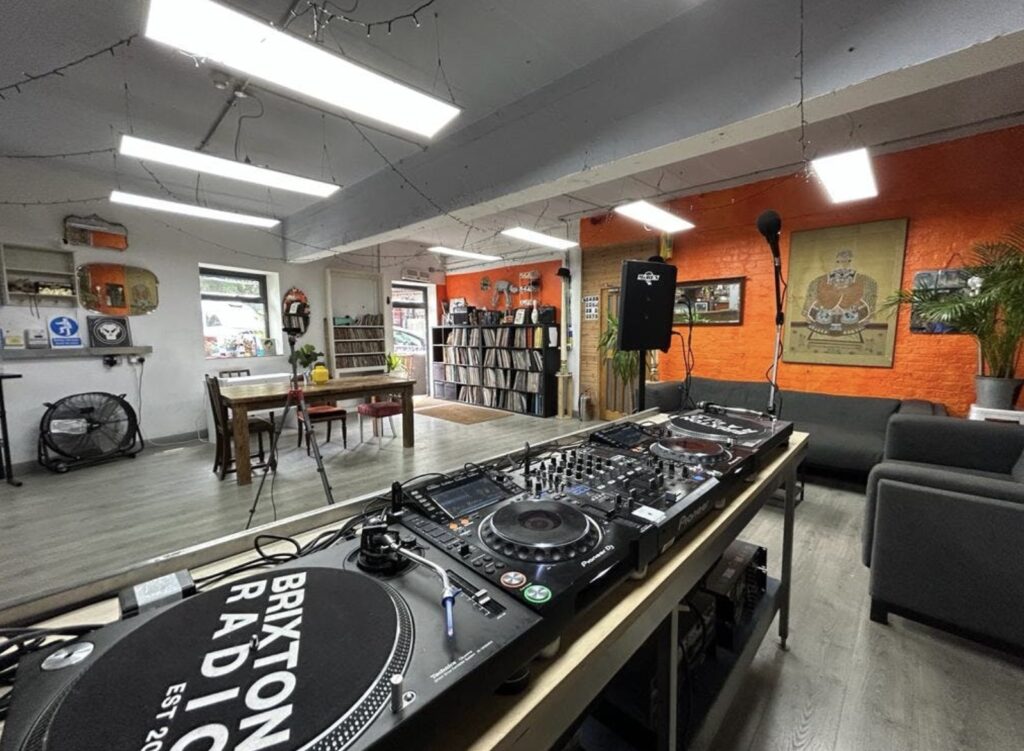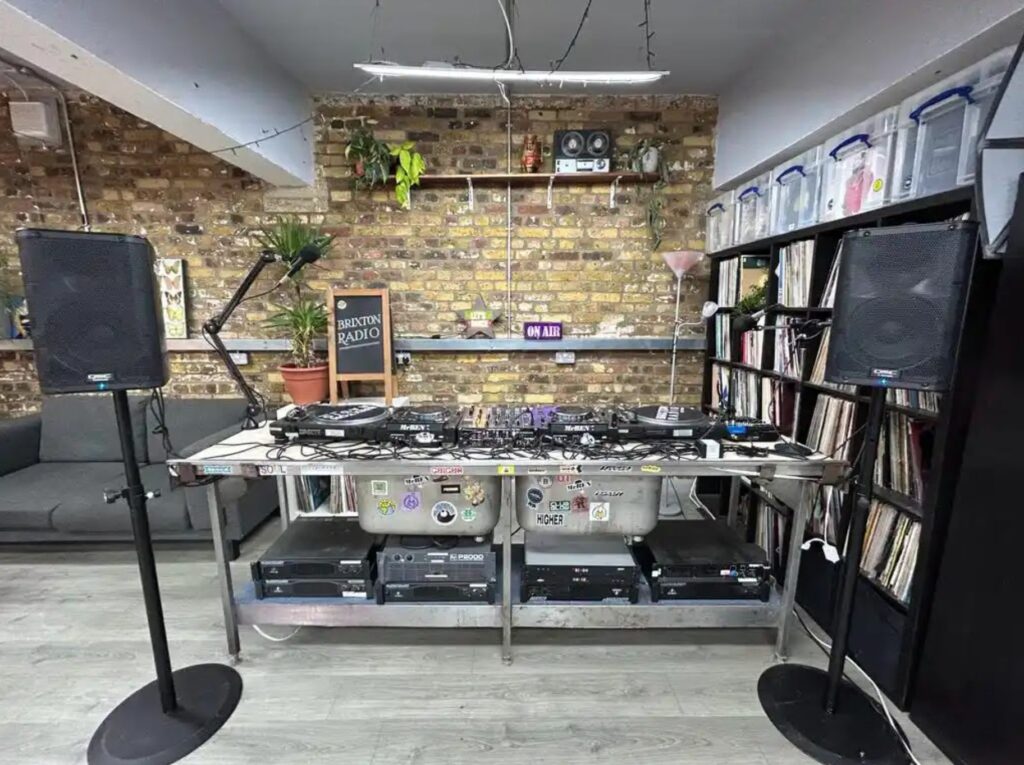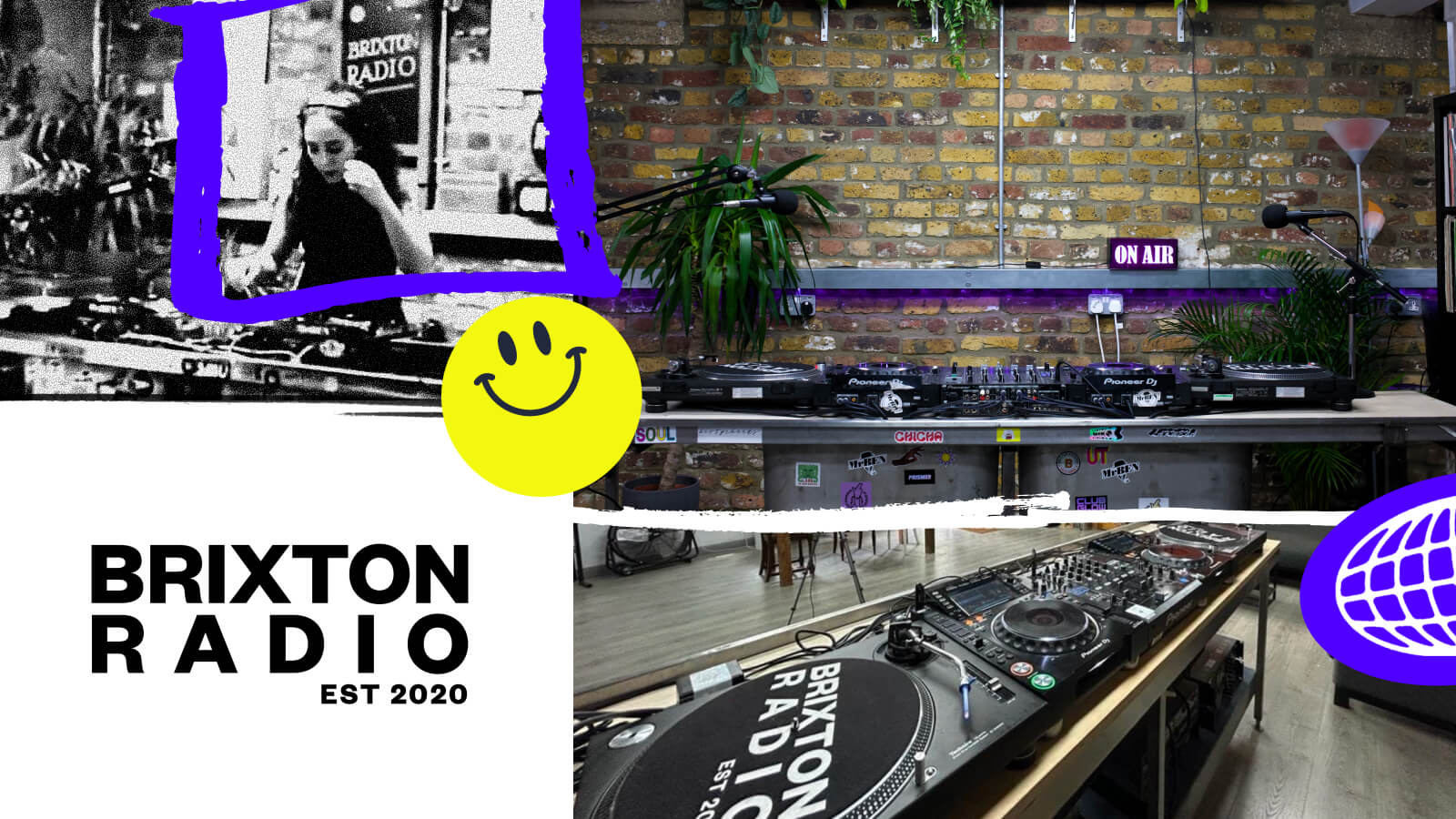Internet radio is a packed space and it often takes truly great stations to stand out from the rest. Over in London, Brixton Radio is doing just that. Founded just as the COVID-19 lockdown kicked in in 2020, the station has created a strong identity via some amazing programming and an emphasis on community. When you enter their studio, you never know what you’re walking into, whether its a Groovy House show or a workshop with local organizations. Brixton Radio has placed being helpful at the heart of its mission, all while making you tap your feet.
In 2024, it announced its No Fixed Abode project, teaming up with the homeless charity Shelter to programme live streamed radio sets from different locations across the UK. The aim is to raise awareness of homelessness and fundraise for the cause. We sat down with Brixton Radio founder Ben Simmons about the project, the history of the station, its experience with Mixcloud and much more.

Contents
- 0.0.1 What is the story of Brixton Radio?
- 0.0.2 How was it trying to get DJs and presenters on board at that time?
- 0.0.3 Who were some of the first artists and DJs to take part?
- 0.0.4 What is your process for bringing new talent in now?
- 0.0.5 How has your experience on Mixcloud helped Brixton Radio’s journey?
- 0.0.6 Brixton Radio is very much rooted in its local community. What kind of work have you done in the area?
- 0.0.7 Tell us about your brand new No Fixed Abode project – how did the concept come about?
- 0.0.8 Why were Shelter the ideal partners for this new venture?
- 0.0.9 You plan to stream from different locations around the UK – can you give us a clue of where future streams might be?
- 0.0.10 Who can we expect to take part in the events? Any notable DJs or radio presenters?
- 0.0.11 Switching back to the station, what are some of your proudest moments over the years?
- 0.0.12 What do you think separates Brixton Radio from other stations?
- 1 Share this:
What is the story of Brixton Radio?
Ben: I’d had an inkling that I wanted to start a radio station for a while, having done a little bit of presenting on a couple of friends’ shows. Then on the first day of lockdown I saw that a lot of people were doing Facebook live streams playing music. People were doing it by their sink with washing up and stuff like this and I thought, ‘how do we make this look good?’ I’ve got a production company so I had access to CDJs and turntables. So we set up a lovely space in the studio at the end of the garden in the building and that was going to be us for however long we were in lockdown. We tried to make the aesthetic aspect of it as important as the music.
How was it trying to get DJs and presenters on board at that time?
I think we had a bit of a head start as I’ve got an agency looking after artists, so we had a bunch of people that I wanted to involve. It was the law of six back then where you were allowed to have up to six people in masks doing a professional stream. So we could invite someone down to the studio to come and play a two hour set, get out, do something with their time and stay slightly relevant. I’ve worked in the industry for years so getting artists in wasn’t going to be the issue. Now, artists and presenters are getting in touch based on the strength of the station rather than any connections I have.
Who were some of the first artists and DJs to take part?
There’s people like The Cuban Brothers and Sophie Lloyd, who had the tune ‘Calling Out.’ People that I was representing like Alex Cuddles who’s still a resident on the station. And just a lot of local people that I knew wanted to get involved. There weren’t really huge names at the beginning but now we’ve had some big names, and the fact that the radio’s run from different locations means we’ve been able to get a lot of variety. People like Horse Meat Disco, Severino, Greentea Peng, Underworld, Terry Farley. Some incredible names as far as I’m concerned and now it feels like we’re building attraction to us. There’s a lot of the new wave of DJs, people who have never played on the radio before and this is their chance to cut their teeth and have the support to learn their trade.
What is your process for bringing new talent in now?
This has been my ethos since the beginning: if someone wants to come and do a radio show, I’m not going to stand in their way. If its brilliant, then they will be welcomed back with open arms. It comes down to the musical vibe you give out. We don’t really want Techno being played in the daytime, for example. We would like it to be a bit more relaxed, with talk-based shows leading up to some House or Disco and then maybe some Drum & Bass and Breaks towards the end of the evening. But I think its about giving people an opportunity to have a go.
How has your experience on Mixcloud helped Brixton Radio’s journey?
Its a slow start when you’re building a radio station from ground zero. You don’t have any traction or listenership. So we immediately wanted to start with Mixcloud. We thought it was the best way to stream our sets. As soon as we got our first website done, we had a Mixcloud widget installed and it was a pull down and it was one of the first things you saw. Our experience has been fairly seamless. We’ve really found our audience here and when we look at our numbers, we look at the Mixcloud numbers. Its been with us since the beginning of our journey and its probably one of the things that’s made us carry on because we’ve seen the traction go up.
Brixton Radio is very much rooted in its local community. What kind of work have you done in the area?
We do a lot of stuff when we’ve got available slots for shows, especially with local companies for people with learning difficulties in and around the Lambeth area. They come in, we produce a show and do workshops with them. There are more of these in the plan throughout the year that are hopefully government funded so we’ve been doing a lot of getting our DBS checks, doing first aid courses and getting risk assessments done. We give people a free trial for their first show, so I believe that we’re helping in that way. This year, we were asked to program the Windrush day events on Windrush Square in Brixton in June. All in all, we just try to do as much as we can.
Tell us about your brand new No Fixed Abode project – how did the concept come about?
The station was here, there and everywhere in the beginning. It was in the garage, a flat, a pub garden. We didn’t have a home until we found our current studio two years ago. So we were officially homeless and trying to find anywhere that would have us. We’re lucky enough to find somewhere that we call home now and some people aren’t as fortunate. So we would like to raise awareness for that with No Fixed Abode.
You could walk down the road and you could ignore a homeless person on the street. But if there was a DJ’d you’d probably stop and watch it. There probably is something a little bit wrong with that and I just want to create awareness. I think with the right DJs, people involved, the right push and promotion, we can have thousands watching streams at one time. That’s the exciting bit for me as well. And the idea for us is we want to be able to do a number of two-hour shows from literally anywhere in the world, every week. Its interesting and different.
Why were Shelter the ideal partners for this new venture?
I worked with Shelter about 20 years ago and it was a pleasure to work with them then. As soon as this idea cropped up in my head, Shelter most resonated with me. Lambeth is one of the most affected areas in the UK for homelessness and they want to get their message across to try and end it.
You plan to stream from different locations around the UK – can you give us a clue of where future streams might be?
We’ll be programming from lidos across London and a series of Ritzy cinemas. We did Shelter’s offices recently as well as our own studio. So we’re now putting the feelers out to all kinds of venues but it could just be a nice little cafe that supports it. Its not all going to be grand museums which will be for special occasions. But it could be a cafe, a record shop – Phonica wants to do one. We’ve already got 20 locations that want to do it. So we just will stagger them out and when we get these opportunities to do a special one we can focus our efforts in making them look incredible.
Who can we expect to take part in the events? Any notable DJs or radio presenters?
I can’t really say any names until they are confirmed but we are speaking to festivals, the Glastonburys of this world. I want to be able to go to festivals, whoever wants us. This is a social cause and so I’m hoping that they will get behind it.
Switching back to the station, what are some of your proudest moments over the years?
Some of the people we’ve trained and employed. The shows we’ve done, the fact that we’re still here. I’m pretty proud of the fact that I’m still doing it. I’ve got a twitching eye because its a stressful job. I’m really proud of this studio and the team. The traction, the numbers going up, I’m proud of the whole thing, and we need to crack on. We did an amazing fundraising event, a 36-hour stream in March 2022 that started off at 93 Feet East in Shoreditch and we made thousands of pounds for Ukrainian refugees. Some amazing events have happened in our studio. I want to get the radio so financially viable on its own that we can support more of these good causes because while we do them for free, I’d love it if the studio and our staff are taken care of.
What do you think separates Brixton Radio from other stations?
Our studio is definitely unique. You walk in here and can see that efforts have gone into it. Lots of character. You’ll see Nik Naks and other snacks on the shelf! I think the nature of it is incredibly eclectic, it doesn’t suggest just one genre or dance music. I want it to represent everything we do. Our team sets us apart from anyone else because they make our streams look as impressive as possible. We have so much drive to want to succeed and carry on. There have been days when we’ve had some incredible lineups that I’d put ahead of some BBC Radio 1 lineups. Once we’re more secure we can improve what we’re putting out and that’s the dream. We definitely need more space to make these things happen, so there’s so much more to do.

To donate to Brixton Radio’s No Fixed Abode project, click here. All proceeds go to Shelter.
